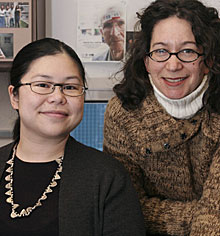Forgetfulness is normal as we age, say psychologists

Karen Li and Natalie Phillips
Photo by Andrew Dobrowolskyj
Two psychology professors at Concordia have been helping seniors with their fears about Alzheimer’s disease, reassuring them that occasional slips of memory are not necessarily symptoms of dementia.
Professors Natalie Phillips and Karen Li held a workshop recently at the Cummings Jewish Centre for Seniors to tell a group of over 50 participants that occasional forgetfulness is perfectly normal. They also offered some techniques to improve memory function.
Concern among the aging population about Alzheimer’s disease is widespread, Phillips and Li told Thursday Report. Interest in the workshop among healthy seniors ranging in age from 50 to 90 was so great that plans for more workshops are now being made.
These “worried well” are typically healthy older adults with normal age-related changes in memory However, they have difficulty interpreting these changes because they often do not have correct information about normative changes in memory. Li said, “There is a big gap in public education for these individuals.”
Participants in the workshop experienced problems such as forgetting keys or people’s names.
Phillips is a clinical neuropsychologist by training whose research is focused on both healthy, normal aging and diseases related to aging. “People have difficulty interpreting what they see as memory slips in everyday life,” she said.
“When you’re 30 years old and you go down to the basement and you can’t remember what you went down for, you don’t worry that that’s a sign of any problem. When you’re 65 years old, that worries you a lot more.
“We wanted to do some education about the origins of changes in memory as you get older, to reassure people that in many ways, these are likely to be normal changes.”
In fact, she said, “there might be 101 reasons why you forget the odd thing, and it may not be indicative of anything serious.” For instance, environmental factors play an important role, Li said. Stress, depression and medication can all influence how well someone pays attention and stores information to be recalled later. Not having an up-to-date prescription for eyeglasses may even play a part.
“It becomes harder to process information because there is less mental energy left over to remember,” explained Li, whose research background is on aging and the division of attention.
Li is interested in “multitasking,” how older adults carry out motor activities like walking and keeping balance at the same time as performing a cognitive activity.
“When we’re older, it takes more mental capacity to do these motor tasks well,” she said. “There’s a kind of tradeoff when you have to focus attention on two tasks.”
In the example of going down into the basement, the individual might be thinking about what someone said as well as trying to keep balance on the stairs. “You might be distributing your attention on many thoughts or different activities.” In the hands-on part of the workshop, Phillips and Li offered some basic techniques to help participants remember things. For instance, when a grocery list is forgotten at home, people are advised to recall items by categorizing them rather than trying to remember the list at random.
“Were there any dairy items you needed to get, any household cleaning items? Rather than have this jumbled up list of garbage bags, oranges and bacon, you need to classify them,” Phillips explained.
The Idea for the workshop grew out of discussions between Dolores Pushkar and the board of the Cummings Centre. It was organized by Li, Phillips and Pushkar, who are all members of Concordia’s Psychology Department and of the Centre for Research in Human Develop-ment. The CRHD is a provincial centre of excellence, with researchers from Quebec universities. Four Concordia graduate and postdoc students helped facilitate the hands-on technique sessions.
“We’re interested in contributing to the community, and having our research informed by the issues we see there,” Phillips said. Li agreed, calling the experience “very rewarding.”